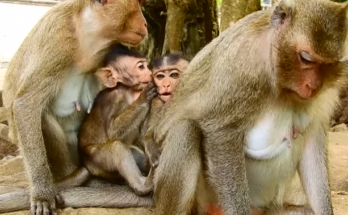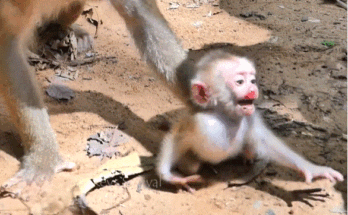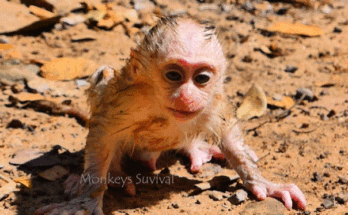The Angkor Wat forest is often described as timeless—its ancient stones wrapped in vines, its canopy alive with the chatter of life. But on this particular day, silence was broken by something more haunting than the whispers of history: the piercing cry of a baby monkey.
I stood among the roots of a strangler fig, camera in hand, when I heard it first—a sharp, desperate sound that cut through the humid air. It was not the playful chatter of young monkeys tumbling in the treetops. It was pain. A cry that made every human instinct inside me tighten. I followed the sound and found the little one—its tiny body wedged awkwardly between a jutting stone and a tangle of roots.
The baby struggled, its limbs trembling, its voice raw from calling out. Each cry echoed against the moss-covered walls of Angkor, rising like a plea from another time. What struck me most, however, was not just the suffering—it was the absence of comfort. Just a few feet away, the mother sat. She glanced once, then turned away, grooming herself as though the cries belonged to some other child, not her own flesh and blood.

The Cry That Wouldn’t Stop
The baby’s voice rose higher, almost shrill. It shook its tiny arms, trying to free itself, but exhaustion quickly set in. Its breaths came ragged, and the sound of its pain mixed with the soft rustling of the forest—an unbearable contrast of serenity and suffering.
I expected the mother to leap forward, to cradle her young, to free it with the strength only she possessed. But she didn’t move. Her eyes flickered toward the baby only once more before she shifted, plucking at a patch of moss on the stone as if this moment didn’t matter. My heart clenched.
This wasn’t just nature’s indifference. This was rejection. And it hurt to watch.
A Human Heart in the Midst of Nature
As I crouched there, my thoughts drifted beyond the forest. I thought of children who cry out for comfort and never receive it. I thought of people who carry the ache of abandonment through their lives, always searching for the arms that never reached back. The baby monkey’s pain was not just an animal’s cry—it was the universal language of longing, one that pierced straight into the soul.
I wanted to step in, to lift the baby, to free it from the grip of the roots and press it against my chest. But this was not my world. This was the raw truth of the wild, where even the bond between mother and child can fracture under pressures unseen.
The Stillness of Witnessing
The forest seemed to hold its breath. A troop of monkeys sat higher in the trees, silent spectators to the unfolding scene. No one came to help. No sibling, no cousin, no passing companion. Just the baby’s relentless cry, unanswered.
Minutes passed like hours. The sound began to weaken, the cries softening into whimpers. My chest ached with each one. In that moment, I realized how fragile survival truly is. How one act of neglect can define the line between life and loss.
The Weight of Departure
Eventually, the mother rose. For a heartbeat, hope surged in me. Maybe now—finally—she would pull her baby free. But instead, she walked away, vanishing into the shadows of the ruined walls. Her figure disappeared as if the cries had never existed.
I remained there, watching, torn between the role of witness and the desperate urge to intervene. The baby’s cries followed me long after I left the site, echoing through my mind as if etched into the stones themselves.
Reflection
That day in Angkor Wat was more than a moment in nature. It was a mirror. It reminded me that the need for love, for protection, is the same across species. And when that love is withheld, the wound is more than physical—it is spiritual.
Perhaps the baby monkey would eventually free itself. Perhaps another member of the troop would step in. Or perhaps its cries would fade into the silence of the forest. I will never know. But I carried those cries with me, a haunting reminder that love is never guaranteed, even where it is most expected.
In the end, the ancient stones bore witness to more than history. They bore witness to pain, longing, and the silence of a mother gone cold.


